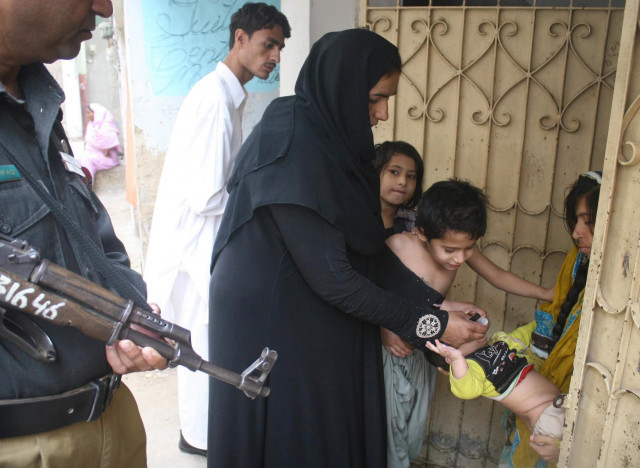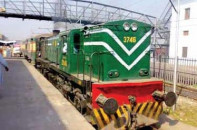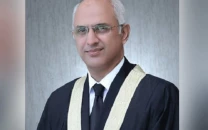Dying on the front line of the polio war
Families of aid workers lament govt apathy to their sacrifice.

Jahanzeb Khan sits at a doctor’s clinic in Tehsil Headquarters (THQ) hospital, Shabqadar in Charsadda, collecting files from patients at the outpatient department before assigning them a waiting number.
He wasn’t always in health services; he used to be a farmer before his wife was killed.

Zakia, a lady health supervisor, was gunned down along with her cousin Ayaz Khan, a driver for the national polio programme, on December 19, 2012 by militants. In fact, Zakia was one of eight who died in a string of attacks on polio workers from December 18 to December 19, 2012.
Since Zakia was not technically a government employee—neither was Ayaz—their families only received Rs300,000 each; the compensation paid to heirs of victims slain in a terrorism-related incident.
[infogram url="" height="490" width="625"]
When Ayaz was shot dead that day, he left behind two wives, six daughters and one son. Maneeza, Ayaz’s first wife, was then given employment in the health department.
“I have three daughters and a son, his second wife Rovina has three daughters,” Maneeza told The Express Tribune. “When we got the compensation money, we built a boundary wall.” There wasn’t much more Rs300,000 could buy for a family of nine.
Both wives try to fend for the family with a polio legacy—Rovina is a lady health worker who still goes out in the field to administer polio vaccines.
“The government didn’t consider paying us the Rs4 million ‘martyr package’ for their employees,” added Maneeza.
Looking for justice, Jahanzeb said both the families have gone to court in a bid to get the compensation given to government employees. Till September this year, the governments of Sindh, Khyber-Pakhtunkhwa and Punjab had not regularised the services of LHWs.

“We’ve appealed that if our beloveds lost their lives in performing a duty for the government, then they must be considered government employees and be compensated accordingly.”
Dead or alive
Polio workers who survive such attacks are also left without much support.
Falak Niaz used to be a polio supervisor in Charsadda and his wife Nazia a lady health worker in Mohmand Agency. Their house in Sro Kalay, Shabqadar was attacked by unidentified militants in April 2014. Nazia, Falak’s mother and two brothers were badly injured that night.
Since then, Niaz has been struggling to pay for their treatment. “I have not received a penny even though I have submitted many applications to the health department,” Niaz told The Express Tribune,
[infogram url="" height="430" width="625"]
“I had to resign from the job, such were the threats to my family and I, and because the government gave me nothing,” he said. “I have approached the World Health Organization and the K-P health secretary for help but no action has been taken.”
When contacted, LHW K-P President Saeeda Feroz said, “They don’t consider us government employees; they don’t even pay us.”
The salary of a LHW is Rs8,000 with Rs2,100 as campaign allowance. She added, however, the LHWs in Charsadda have not been paid for January, February and September campaigns or the salary for September. “And then they want us to go out and face the threat with one sepoy?”
According to Feroz, there is a certain lobby that sees the end of polio as the end of their inflated salaries and budgets. “People like us on the frontline trying to eliminate the disease remain without incentive.”
K-P’s focal person for polio, Dr Imtiaz, said a plan was devised in 2013 to raise the compensation for slain polio workers to Rs1 million and for those injured to Rs300,000 with free treatment. Imtiaz insisted he has advised authorities to prioritise and act upon the plan.
For more stories on polio attacks, click here
Published in The Express Tribune, October 24th, 2014.



















COMMENTS
Comments are moderated and generally will be posted if they are on-topic and not abusive.
For more information, please see our Comments FAQ